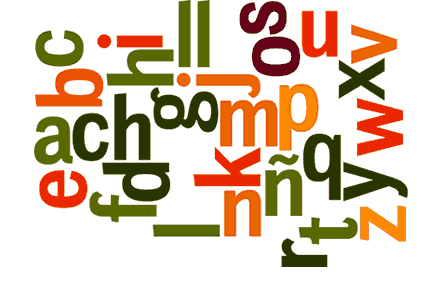Learn Spanish
| English | Spanish | |||
|---|---|---|---|---|
| Hello | ¡Hola! | |||
| Hello | ¡Buenos días! | |||
| Good evening | Buenas noches | |||
| Goodbye | Adiós | |||
| See you later | Hasta Luego | |||
| Yes | Sí | |||
| No | No | |||
| Please! | ¡Por favor! | |||
| Thanks | Gracias | |||
| Thanks a lot | ¡Muchas gracias! | |||
| Thank you for your help | Gracias por su ayuda | |||
| You’re welcome | De nada | |||
| Okay | De acuerdo | |||
| How much is it? | ¿Cuánto cuesta? | |||
| Sorry! | ¡Discúlpeme! | |||
| I don't understand | No entiendo | |||
| I get it | Entendí | |||
| I don't know | No sé | |||
| Forbidden | Prohibido | |||
| Excuse me, where are the toilets? | ¿Dónde están los baños? | |||
| Happy New Year! | ¡Feliz año nuevo! | |||
| Happy birthday! | ¡Feliz cumpleaños! | |||
| Happy holiday! | ¡Felices fiestas! | |||
| Congratulations! | ¡Felicidades! |
“I want to quickly master essential Spanish expressions”
Imagine: in a few minutes, you will pronounce and understand your first Spanish expressions.
The result is IMMEDIATE.
Here's how it works:
- You select the first theme from the library below.
- Once in the player, you click on all the expressions to listen to them and discover their meaning.
Try to memorize them by visualizing them with closed eyes.
Feel free to consult the "Information" sheets (Button "I"). This information will help you memorize them. - You repeat the expressions out loud, using voice recognition (on Chrome only).
- You take the level tests (button with a "Diamond" icon):
- If you answer correctly, the expression will reappear after a certain delay, which increases over time (spaced repetition principle).
- If you answer incorrectly, the expression will reappear a few hours later.
- You visualize your progress by clicking on the "Statistics" icon. This will be complete after about 8 weeks, with a minimum of 20 sessions spaced over this period.
- Icons alert you when a level test is available. You can always practice between these tests, but they will not count towards your progress.
This training is FREE.
However, we offer a LIFETIME package that gives you access to several important advantages in ALL current and future languages of the "First Contact" training. Here are these advantages:
- Unlimited downloads of audio files and printable lists.
- Access to the "Immersion" mode, to listen to expressions in loops, in both languages, without having to look at the screen.
- Download training certificates.
- Removal of advertisements throughout the site.
Looking for a higher-level course?
With this online course, you will naturally gain confidence in just a few months, without ever feeling like it’s an effort.
Your biggest surprise will come when, after just a few weeks, you hear or read phrases outside of the method and think: "Wow, I almost understand everything!".
Here are 7 practical tips to learn Spanish:
- Establish a Daily Learning Routine
Commit to practicing Spanish every day. Set regular time slots for specific activities like reading, listening, and practicing the language. This point is very important. Be uncompromising and make this routine a priority, or you will always find an excuse to postpone your learning.
- Use Loecsen Extensively
Use our site to practice exercises every day and train yourself to pronounce out loud.
- Watch Series and Movies in Spanish
Watch popular series with Spanish subtitles to improve your listening comprehension and learn common expressions.
- Read in Spanish
Read articles, books, and blogs in Spanish. Start with simple texts and progress to more complex content as you improve.
- Listen to Podcasts and Audiobooks
Listen to Spanish podcasts on topics that interest you. This helps improve your listening comprehension and familiarize yourself with different intonations and accents. You will find everything by searching on YouTube.
Even better: retrieve subtitles and use them on our "Read Aloud" page (it’s completely free). There is no better way to work on pronunciation and free your fear of speaking in a new language. - Learn Through Music
Listen to Spanish songs and try to understand the lyrics.
Again, our "Read Aloud" tool can help you incredibly. You can even take fill-in-the-blank tests with voice recognition on the lyrics of your favorite artists! - Set Specific and Measurable Goals
Set clear and achievable goals, such as being able to hold a simple conversation in three months or reading a book in Spanish in six months. Track your progress regularly.
In each of our training sessions, we give you the goals to achieve as well as the number of days/hours/sessions to follow.
How to Learn Spanish by Yourself? Start with an Easy and Free Online Course!
We have adopted an objective and efficient approach to learn how to speak a language easily and quickly: we suggest you start by memorizing words, phrases, and practical expressions that you can use in everyday life and that will be useful when traveling.
Getting used to pronouncing words out loud, numbers for instance, is an easy exercise that you can practice often and at any time throughout the day.
It will help you get used to the sounds of your chosen language and thus make it more familiar.
And once your vacation begins, in Spain, Argentina, or another Spanish-speaking country, you will be surprised how familiar and easy to understand it will seem.
Furthermore, using a pocket dictionary is always useful, particularly during a trip. It enables you to find the translation of new words and enrich your vocabulary.
Why Speak Spanish While Traveling?
Castilian is the Third Most Spoken Language in the World
And consequently, one of the most used in business and international communication, being spoken as much in Europe as in Africa, in the Americas as in Asia.
Spoken by more than 550 million people, of which nearly 470 million are native speakers. It is the official language of 25 countries, 19 of which are in America: Argentina, Bolivia, Colombia, Costa Rica, Cuba, Chile, the Dominican Republic, Ecuador, El Salvador, Equatorial Guinea, Guatemala, Honduras, Mexico, Nicaragua, Panama, Paraguay, Peru, Uruguay, and Venezuela. This is why it is not surprising that this language is a symbol of a globalized world.
A Way into Different Cultures
The ethnic diversity of Spanish speakers is a plus for all who learn this language, as this learning opens up to a world of multiple cultures from which the gourmet gastronomy and the great literary works of authors such as Pablo Neruda (Chile), Gabriel García Márquez (Colombia), and Mario Vargas Llosa (Peru), all Nobel Prize laureates, are examples.
Beyond this rich and global culture, speaking this language opens the doors to all kinds of business around the world. After all, Spain is the ninth largest global economy, and the United States has the second largest Spanish-speaking population in the world with no less than 53 million people. Expanding economic markets in South and Central America are another good reason to begin to memorize business vocabulary and advance your career.
How to Start?
There are no good or bad techniques when you start learning a language by yourself: in essence, you need to trust yourself and let your instinct for discovery guide you through the learning process.
The only thing you should never do is to lose sight of what motivated you to speak it: the desire to read Miguel de Cervantes or one of the eleven Spanish-speaking Nobel Prizes in literature in the original version, the crazy love that you fell for Enrico Macias or for the Barça team, the desire to settle in Barcelona, Madrid, or in Latin America…
Whatever it may be, keep this in mind and direct your beginner lessons around it as much as possible, so that your energy will stay intact.
If It's Free, Will It Really Be Serious?
If you have an Internet connection, you have a world of learning possibilities. Actually, there are very good free websites dedicated to teaching almost every language in the world — and you will find many good resources to help beginners take their first steps in Spanish. So save your money for later when you will want to move on to a higher level.
Make a Success of Your Stay in a Spanish-speaking Country
Whether you are going to spend a few days with friends for a leisure trip or if you are on a business trip, nothing will be more useful to you than to be able to slip a few words in the language of your interlocutors, who will appreciate your effort and will be certainly more willing to help.
How to Succeed in Having Good Pronunciation Within a Week to a Month?
You Can Get by Learning the Alphabet and Some Rules
If you learn to pronounce correctly all the letters of the alphabet and memorize the three essential rules to place the tonic accent correctly, then you will quickly have an adequate accent.
1. All letters are pronounced, except the « u » in the syllables « gue », « gui », « que » and « qui », unless this « u » bears an umlaut as in « vergüenza ».
2. The « h » is also mute.
3. The tonic accent is very important, and the logic of its location on the word rests on three essential rules easy enough to memorize:
When a word ends with a vowel, an « n » or an « s » the accent will be on the penultimate syllable.
When a word ends with a consonant it will be on the last syllable unless it is « n » or « s ».
Otherwise, the tonic vowel carries a sharp accent as in « aquí » (here).
There are still some subtleties to be seen about the place of the tonic accent, but this is already a good beginning.
The pronunciation will also vary between the Castilian of Europe and Latin America — but it should never stop you from making yourself understood.
We invite you to listen to the pronunciation of the letters by clicking on the following link: Spanish alphabet with audio.
Useful Online Resources for Learning Spanish:
- Instituto Cervantes
Level: All levels
Services: Comprehensive courses, cultural resources, and official DELE certification.
Our opinion: A top-tier resource for structured learning and cultural immersion.
Plan of our "Primer Contacto" Spanish course
This course lasts approximately 2 to 3 months and will require around 50 hours spread over a hundred sessions.
- Conversation: learn basic greetings in Spanish, daily expressions, and important phrases for any circumstance. If you were to learn only one vocabulary, this is it! From "Hola" to "Gracias" to "Disculpe, ¿dónde están los baños?", you will master the survival kit to handle the most common situations during a stay in Spain, Mexico, Argentina, or another Spanish-speaking country.
- Learning: assimilate the vocabulary and practical phrases to learn how to learn in a new language and get help from locals. Whether you are in Spain or Argentina, asking for help will be much easier with these practical phrases.
- Colors: learn the names of the main colors. This may not seem like the most useful vocabulary at first glance, but in reality, these words are among the first learned by children, and for good reason. Naming colors strongly structures our perception of the world, and knowing how to pronounce them in a new language will be your first sign of truly belonging to the Hispanic world you seek to join through language. Imagine describing the magnificent colorful landscapes of Chile or Colombia with ease.
- Numbers: knowing them is essential for daily transactions and understanding elements such as dates and prices. Whether paying for a coffee in Buenos Aires or understanding an address in Mexico City, knowing numbers is indispensable.
- Time References: learn phrases to tell the time and discuss dates. This will be particularly useful if you need to make an appointment in Spain or plan an excursion in Peru.
- Taxi: all the vocabulary for hailing and taking a taxi. And also indicating the way or asking the driver to slow down. These phrases will be useful for navigating cities like Madrid or Buenos Aires.
- Family: the section of terms for family members and discussing family. Talking about your family with locals in Mexico or Chile can create deeper connections.
- Feelings: list of expressions to describe emotions. Appropriately expressing your feelings will be very useful in social interactions, whether in Spain or Argentina.
- Bar: learn to order drinks in a bar in Spain, Mexico, Argentina, Colombia, Chile, or Peru, etc. This is the favorite theme of many of our learners! Imagine confidently ordering a local drink at a bar in Barcelona or Mexico City.
- Restaurant: find here all the vocabulary that will allow you to act like the locals in a restaurant. Whether you are in a fine dining restaurant in Madrid or a cozy café in Bogotá, you will be comfortable placing your order.
- Leaving: learn the vocabulary to say goodbye and leave a good impression. Saying goodbye politely to friends met in Colombia or Spain will always leave a good impression.
- Transport: this theme is essential if you intend to travel by bus or train. Whether taking the subway in Madrid or the bus in Buenos Aires, this vocabulary will be very useful.
- Hotel: in most countries in the world, you will find people who speak English at hotel reception. So it's not the most essential subject. But it’s definitely the most beneficial if you want to practice speaking Spanish with people who are patient and eager to help! Not all expressions in this theme are necessarily useful in all countries. You can filter them yourself based on your destination. Check your reservations or ask for local recommendations, whether in Spain or Argentina.
- Looking for someone: you will find here the words and phrases to find someone and, if the person is not there, how to reach them. Very useful if you need to find a friend in a big city like Madrid or Mexico City.
- Beach: this may not be the most important theme of this course, unless you are a child! However, it should not be overlooked, as it is also a matter of safety. Indeed, knowing how to ask for information about the dangers of an environment can save you from big problems. Think of the beaches in Spain where knowing safety instructions can be vital.
- In case of trouble: don't take this theme lightly, as it could save your life! Whether you are hiking in Peru or in the city in Mexico, these phrases could be crucial in case of an emergency.
Are you ready to speak Spanish?
You just need to click on the first theme below!





